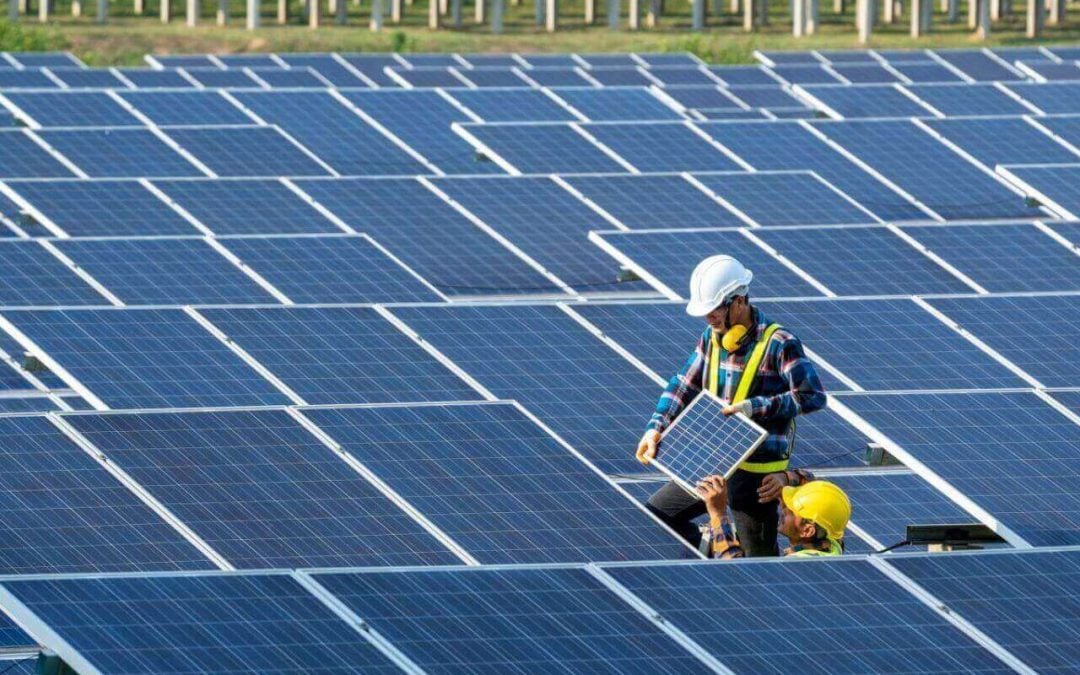The solar industry in India is a cornerstone of the country’s renewable energy transition, with ambitious targets to achieve 280 GW of installed solar capacity by 2030. Rising energy demand, supportive government policies like the National Solar Mission, and falling costs of solar technology have propelled growth. India’s strategic geographic location with abundant sunlight makes it ideal for harnessing solar energy.
Key players in the sector include Tata Power Solar, Adani Green Energy, ReNew Power, and Vikram Solar. These companies are investing in large-scale solar farms, rooftop solutions, and advanced photovoltaic technologies. With increasing global interest and domestic focus on clean energy, the solar industry presents vast opportunities for economic growth and sustainable energy solutions.
Government Initiatives
The Indian government has introduced several initiatives to boost the solar sector, aiming for 280 GW of solar capacity by 2030. The National Solar Mission underlines the development of solar parks and rooftop installations. The PM-KUSUM scheme promotes solar pumps for farmers, reducing dependency on grid electricity. Subsidies, tax exemptions, and viability gap funding encourage investments.
The Production Linked Incentive (PLI) scheme supports domestic manufacturing of solar modules, reducing import reliance. Policies like net metering and renewable energy certificates further enhance adoption. These initiatives collectively aim to make India a global leader in renewable energy while achieving energy security and sustainability.
Anti Dumping Duty
The Ministry of Finance imposed anti-dumping duties on textured tempered glass used in solar panels after the Solar Ancillary Manufacturers’ Association (SAMA) filed a complaint. The duties, ranging from $673 to $677 per metric tonne for Chinese imports and $565 per metric tonne for Vietnamese imports, were introduced to address concerns that underpriced imports were harming domestic manufacturers like Borosil Renewables.
The Directorate General of Trade Remedies (DGTR) reported that these imports, which made up 98% of India’s solar glass needs, significantly undercut local prices. Based on this, the DGTR recommended the duties to safeguard domestic manufacturers and ensure fair competition.
Rise in Electricity Cost/ Issue of Project Developers
Developers have expressed concerns that the newly imposed anti-dumping duties on solar glass will increase the cost of solar panels, potentially making ongoing projects unviable. Independent Power Producers (IPPs) estimate a price hike of ₹1 to ₹2.50 per watt peak based on the reference price of $677 per metric tonne.
At an exchange rate of ₹85 per dollar, the effective duty amounts to ₹57.5 per kg, adding approximately ₹1,439 per panel. For a 550 MW panel, the cost increase per watt peak is estimated at ₹2.62. With domestic production meeting only 84% of demand, developers worry that these higher costs and potential shortages will delay projects, jeopardizing India’s renewable energy targets.
The Issue of Independent Power Producers
Independent Power Producers (IPPs) have called for a deferral of the anti-dumping duties on solar glass until domestic production can meet demand. Many developers are considering invoking the ‘Change in Law’ clause in their contracts, allowing them to renegotiate terms due to unforeseen regulatory changes.
However, concerns remain about the ambiguity surrounding regulatory approvals for such claims. The ‘Change in Law’ clause allows parties to adjust project terms if new regulations significantly impact costs or timelines. IPPs hope to use this clause to recover additional costs from the duties and maintain the financial viability of their solar projects.
Stocks which will benefit are:
Borosil Renewables: The shares of the company are currently trading at Rs. 586.4 up by 2.34% from its previous close of Rs. 572.95 as of December 10, 2024.
Waaree Renewables: The shares of the company are trading at Rs. 3,108.3 up by 4.63% from its previous close of Rs. 2,971.3 as of December 10, 2024.
Conclusion
The anti-dumping duties represent a complex balancing act between protecting domestic solar manufacturing and maintaining renewable energy project feasibility. While the measure supports local manufacturers like Borosil Renewables, it risks increasing solar project costs and potentially delaying India’s clean energy transition. The industry now faces the challenge of navigating these regulatory changes, with IPPs exploring contract renegotiation and seeking ways to mitigate financial impacts.
Written By: Dipangshu Kundu
Disclaimer

The views and investment tips expressed by investment experts/broking houses/rating agencies on tradebrains.in are their own, and not that of the website or its management. Investing in equities poses a risk of financial losses. Investors must therefore exercise due caution while investing or trading in stocks. Dailyraven Technologies or the author are not liable for any losses caused as a result of the decision based on this article. Please consult your investment advisor before investing.





